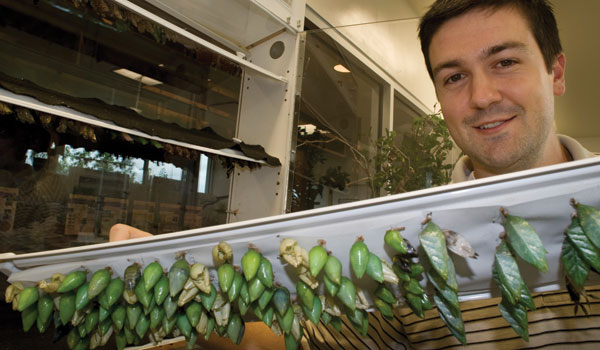Excel
By Lindsey Robinson

Doctoral Student Promotes Nature Through Travel
When Court Whelan finally made it to the Pacific island village after two jostling hours in a tiny airplane, one of the first things he saw was a pack of crouching, creeping zombies.
He flicked on his high-definition video camera and started filming as they surrounded a hapless family. When the family fled in terror, the creatures, shaking their massive heads and clacking their long fingernails, started toward Whelan and his group.
Whelan was thrilled.
The UF graduate student had just filmed a traditional “mud men” dance of a tribe in Papua New Guinea. Legend says the tribe had reclaimed its land after an attack by painting their bodies white, wearing masks and emerging from the cemeteries to terrify their captors.
“It left an impression on me that I will never forget,” he said.
Whelan is a doctoral fellow in UF’s entomology program and the general manager for Expedition Travel, an agency that organizes educational trips for the Florida Museum of Natural History.
He is also the first graduate student in his specialization — ecotourism entomology, which promotes the study and conservation of insects through tourism. The program was Whelan’s idea, but it became a reality with the help of entomology professors Tom Emmel, Jaret Daniels and John Capinera.
Through Expedition Travel, Whelan organizes six to eight trips a year to study wildlife around the world.
Whelan has led ecotourism trips to Belize, Mexico, Panama, Costa Rica, Ecuador, the Galapagos Islands and Madagascar. When he’s not taking classes or traveling, he makes films and postcards from his footage.
In Mexico, he’s filmed hundreds of millions of butterflies blocking out the sun as they crowded into just a few acres of land. The flit of their collective wings produced a powerful whoosh, Whelan remembers.
“It’s more moving than just about anything you can imagine,” he said.
Whelan said his two favorite places are Madagascar and the Galapagos Islands. Many of the animals in these places are found nowhere else on the planet.
On the Galapagos Islands, he was able to snorkel next to Galapagos penguins, marine iguanas and sea lions that blew bubbles underwater at him. Because the islands are home to very few natural predators, the animals have almost no fear of humans.
Whelan wants to make more moments like these, which most people see only on the Discovery Channel, available to everyone.
“I’m just enthralled with the natural world,” he said.